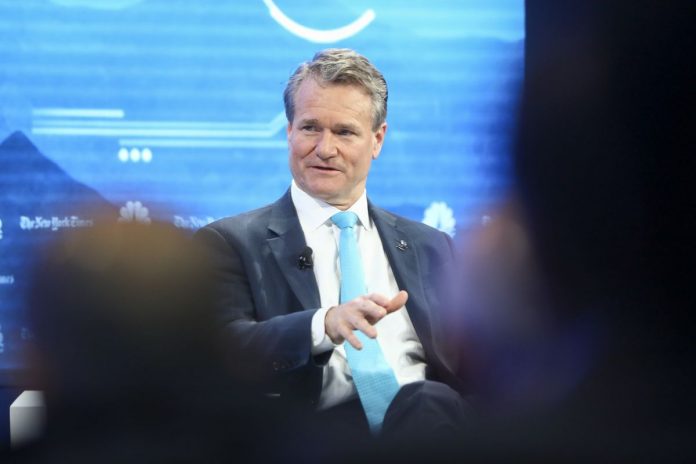
NEW YORK – Bank of America Corp. CEO Brian Moynihan predicted another round of consolidation in the United States that could lead to the emergence of a new competitor.
The Charlotte, N.C.-based lender, which controls about 13 percent of the United States retail-banking market, came together through the mergers and acquisitions of hundreds of companies, Moynihan said on a panel at the World Economic Forum in Davos, Switzerland. The creation of a megabank could happen again, as there are still thousands of banks operating across the U.S., he said.
“How does somebody emerge? The same way we emerged,” Moynihan said. “The emergence will come out of the consolidation of another round of people which still has to happen in the United States. There are now 6,000 odd banks, and you’ll find them continuing to consolidate.”
Industry executives have long predicted a wave of bank mergers that’s so far played out only in smaller or mid-sized deals. Ernst & Young expects a flurry of transactions this year, fueled by easing regulations and the U.S. tax overhaul, which helped lenders build a war chest to spend on acquiring new clients and technology, the financial advisory firm said in a report last month. The value of mergers and acquisitions in the U.S. financial-services sector more than doubled to $196.5 billion in 2018 from $82.3 billion in 2017, EY said.
The biggest U.S. banks are likely to get left out of any deal frenzy. Such potential deals would face political hurdles, according to Citigroup Inc. CEO Michael Corbat.
“In the U.S. today, there’s probably not much appetite for the big banks to get bigger” from politicians and regulators, Corbat said in an interview in Davos with Bloomberg Editor-in-Chief John Micklethwait. Over time, limiting global banks’ growth will lead to a “sub-optimal outcome,” he said.
The long awaited bank-merger boom has been held back by regulatory scrutiny and capital rules that enforce more stringent requirements as lenders get larger. Still, there have been signs of regional banks becoming more active, including Fifth Third Bancorp’s pending acquisition of Chicago’s MB Financial Inc., the biggest announced U.S. bank merger in the past three years.
A new hurdle for deals is the recent decline in bank stocks, said Laurie Hunsicker, an analyst at Compass Point Research & Trading LLC.
“With the deflation of M&A deal pricing, it is more likely that boards previously contemplating M&A will instead focus on organic growth and returning excess capital back to shareholders,” she wrote in a note. “Pricing will likely drop sharply in 2019. Deals that previously worked earlier in 2018, no longer work.”
The rules that govern banking shouldn’t be rolled back in order to increase competition, said Moynihan, whose company needed a $45 billion bailout during the 2008 financial crisis.
“We know what it will lead to – increased losses of people’s money,” he said. “It doesn’t benefit us. It’s the same the reason you have a speed limit on a highway. It’s the rules of operation.”
Donal Griffin, Sridhar Natarajan and Lananh Nguyen are reporters for Bloomberg News.











